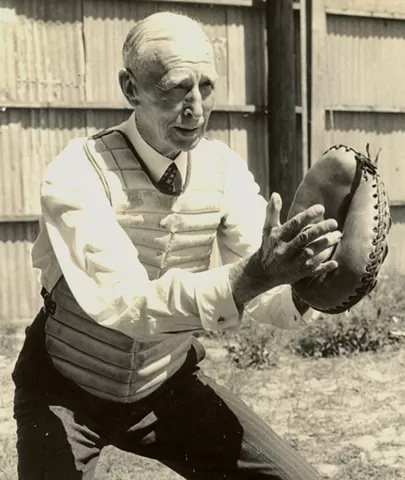Connie Mack (1862-1956) was born Cornelius Alexander McGillicuddy in Massachusetts. He became a professional baseball player, manager, and team owner who long held several Major League Baseball records.
Mack started in the Connecticut State League and then became primarily a catcher for three National League teams from 1886 to 1896, managing the Pittsburgh Pirates during the last two years. He became manager, general manager, and part owner of the American League’s new Philadelphia Athletics in 1901, and then sole owner in 1936. “Mr. Mack,” as he was called, retired after the 1950 season at the age of 87, the longest consecutive management in professional sports in North America. Mack saw baseball as a business more than a sport, and his business was mostly successful. He led the Athletics to five World Series wins and nine American League pennants. They also set a record by finishing last seventeen times under his management.
“Mr. Mack” addressed his players by their given names instead of nicknames, and never raised his voice to them. He was a gentleman and a father figure. On the other hand, he would inconvenience others to save a dollar. While other managers wore their teams’ uniforms, Mack wore a suit and tie, and a fedora.
Mack was married twice. He had three sons who were actively involved with his team, and four daughters. His grandson, Connie Mack III (Cornelius Alexander McGillicuddy III), was a member of the U. S. House of Representatives from Florida (1983-1989) and the U. S. Senate (1989-2001). His great-grandson, Connie Mack IV (Cornelius Alexander McGillicuddy IV), has served in the Florida House of Representatives (2000-2003) and the U. S. House of Representatives (2004- ).
Connie Mack Field was renamed from Wright Field in 1952. During its forty years, it served as a spring training camp for the St. Louis Browns and the Philadelphia Athletics. Some of the most famous names in baseball played there, including Joe DiMaggio, Jackie Robinson, Babe Ruth, Lou Gehrig, and Mickey Mantle. In 1992 the ball field became the site of the parking garage for the Raymond F. Kravis Performing Arts Center.


